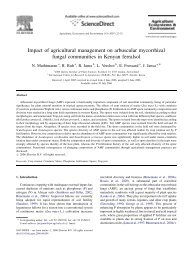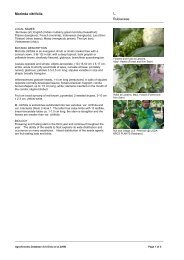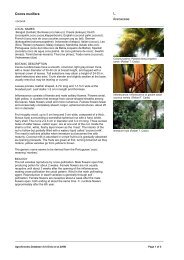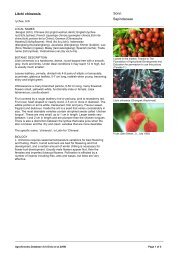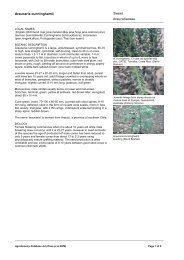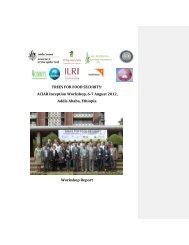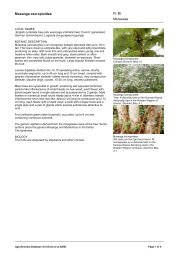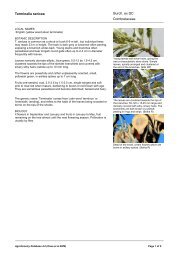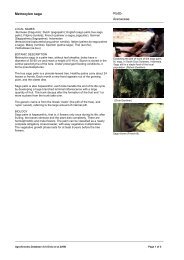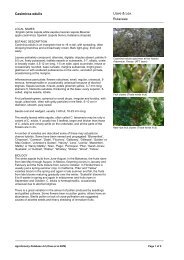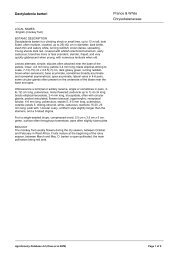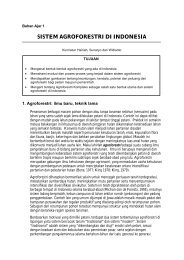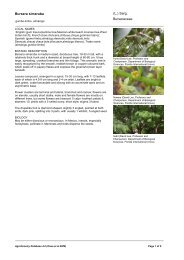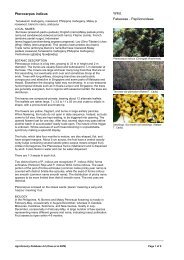Peach palm - World Agroforestry Centre
Peach palm - World Agroforestry Centre
Peach palm - World Agroforestry Centre
Create successful ePaper yourself
Turn your PDF publications into a flip-book with our unique Google optimized e-Paper software.
Promoting the conservation and use of underutilized and neglected crops. 20. 41<br />
in the plantation have probably significantly reduced its genetic variability and<br />
made the material vulnerable to future phytosanitary problems.<br />
Seeds are relatively easy to prepare for sowing. Extract the seeds from recently<br />
matured fruits, and soak them 1-2 days to soften the mesocarp, which generally<br />
adheres to the seed. Then rub the seeds together under running water to remove<br />
any attached mesocarp, and treat them with fungicide for 15-30 minutes (contact<br />
researchers listed in Appendix I for appropriate treatments). Dry them in a<br />
ventilated, shady location for 8-24 hours to evaporate excess superficial moisture.<br />
When they appear slightly moist but not dry, they are ready for sowing or storage.<br />
The seed is considered recalcitrant, but management of its moisture content and<br />
storage temperature may extend storage time (Villalobos 1991). The fresh seed has<br />
a moisture content of 45-50%. When seed moisture falls below 38-40% germination<br />
is reduced (Ferreira and Santos 1992). Excessive seed moisture favours fungal<br />
growth. Villalobos and Herrera (1991) tested the effect of seed moisture content<br />
(20, 30 and 40%) and storage temperature (5, 15 and 25°C): after 12 months storage<br />
in plastic bags, the best germination was 64% at 40% initial moisture and 25°C. In<br />
this treatment, seed moisture content fell from 40% to 31% during storage, but was<br />
raised again to 40% before germinating the seeds (imbibition in water for 3-4 days).<br />
Seeds can be germinated in different ways: in nursery beds or bags with<br />
substrate, and in plastic bags or containers with minimal water and no substrate<br />
(Mora-Urpí 1980; Villachica 1996). Seeds should not be exposed to direct sunlight<br />
during germination, and, if necessary, watering must be carefully regulated to<br />
avoid fungal growth. Various substrates are used in the nursery beds: coarse sand,<br />
decomposed sawdust, light-textured soil, and mixtures of these materials. Seeds<br />
can be sown in nursery beds for production of bare-root seedlings (20 x 20 cm<br />
spacing). Alternatively, they can be sown at closer spacing and, after germination,<br />
transplanted to nursery bags (black plastic, 20 cm diameter x 30 cm tall) or other<br />
containers. During germination, the seeds should be covered with about 2 cm of<br />
soil or decomposed sawdust. A thin layer of leaves placed over the soil/sawdust<br />
will reduce water erosion and help shade the seeds from direct sunlight. No<br />
additional shading is necessary during germination. Germination in plastic bags<br />
requires less space than germination in nursery beds: the seeds are placed in bags<br />
and, with appropriate initial humidity, they require no watering. However, fungal<br />
growth is often a problem in the plastic bags, especially if the mesocarp was not<br />
completely removed and has fermented, and if the seeds were not treated properly<br />
with fungicides.<br />
Seeds normally germinate in 30-90 days without any special pretreatment. One<br />
simple pretreatment may accelerate germination: place the seeds between sheets of<br />
transparent plastic and cover this with black plastic, place it in full sunlight and<br />
water frequently (Herrero-Haack 1988). This method requires refinement since<br />
results have not been consistent (Villalobos and Herrera 1991). Attempts to<br />
accelerate germination by rupturing the seed coat and other pretreatments<br />
involving temperature, substrate, plant growth regulators and other chemicals



